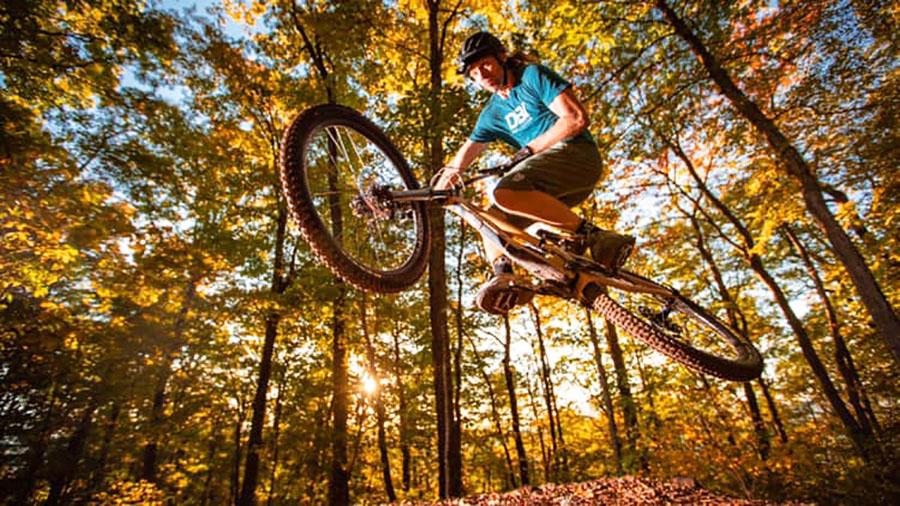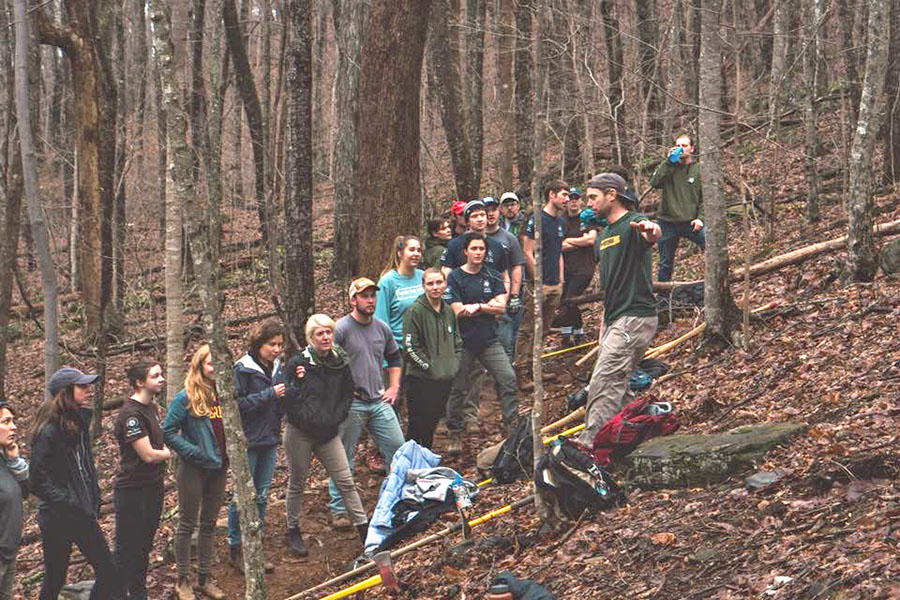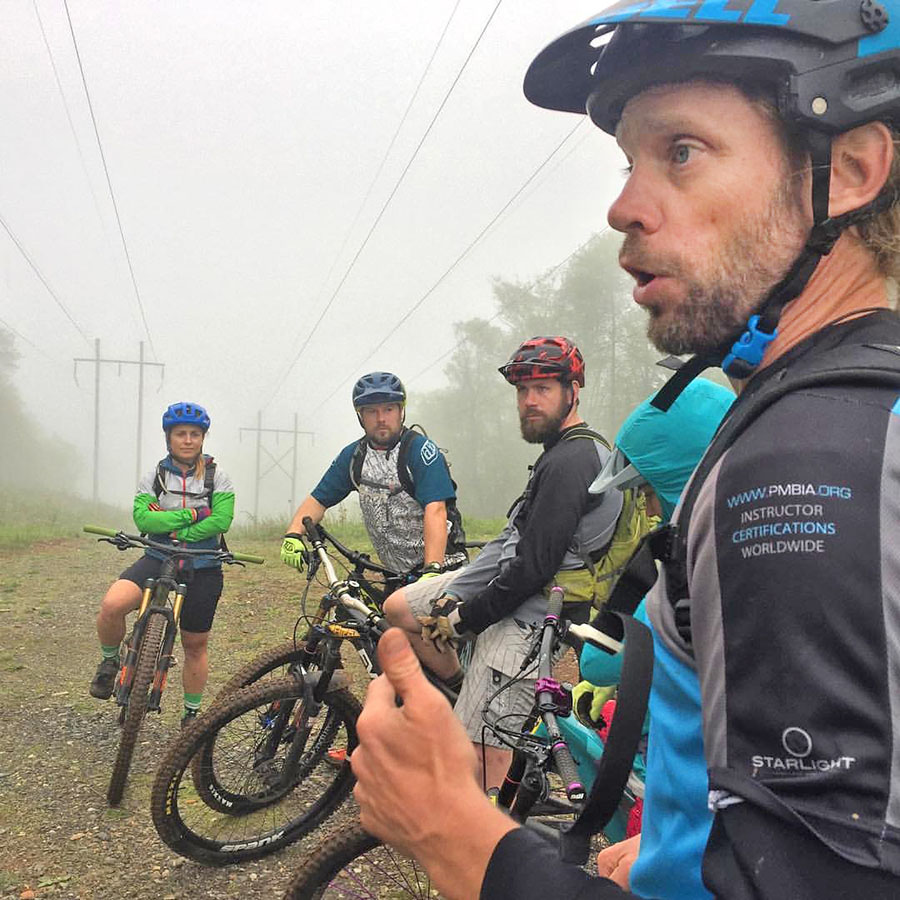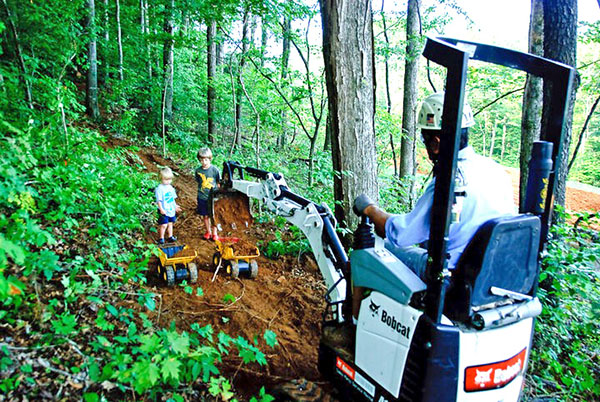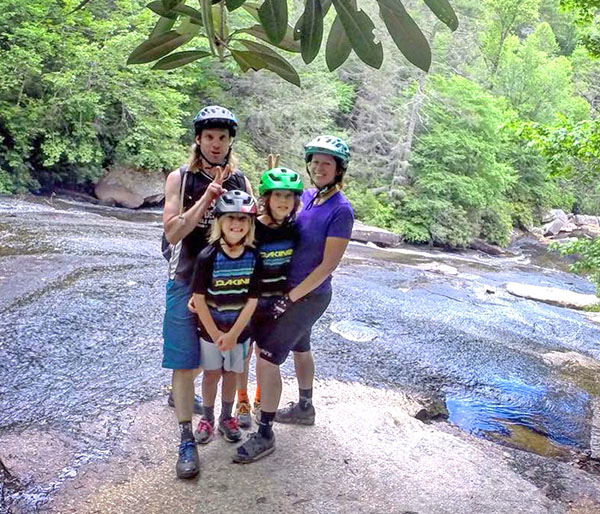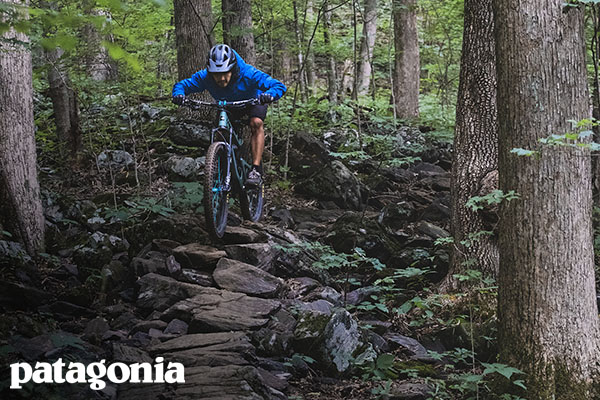BOONE, N.C. — Kristian Jackson likes to play in the dirt. If he isn’t building mountain bike trails, he’s riding them — zipping around berms, bumping over roots and sailing sideways during a jump.
And Jackson — a senior lecturer in Appalachian State University’s Department of Recreation Management and Physical Education (RMPE) — has managed to transform his personal passion into an act of stewardship and community service, as well as an educational opportunity for his students.
Building Rocky Knob Park
Jackson has been instrumental in leading volunteers in the development of Boone’s Rocky Knob Park, a 185-acre mountain bike park with elevations climbing to about 4,000 feet.
The park was established in 2009, when Watauga County’s Tourism Development Authority (TDA) hired Eric Woolridge ’01 ’11, an Appalachian alumnus and outdoor recreation planner, to evaluate the recreational assets of the county.
“Eric determined the key missing piece was mountain biking,” Jackson said. “When visitors asked bike shop owners where to mountain bike, they’d be sent off the mountain, because there were no legal trails in Watauga County at that time.”
Jackson heard about the planned park from a student and contacted Woolridge to see how he could get involved. “After hearing my credentials, Eric said, ‘I’ve got a job for you — but it doesn’t pay anything,’” Jackson said with a laugh.
“Kristian Jackson’s contribution to our community through Rocky Knob Park and the impact of his leadership can’t be overstated. It’s a generational impact,” said Woolridge, now founder and principal at Destination by Design Planning in Boone. “Students’ lives are changed. Our kids will grow to become better leaders. Parents are healthier. Our economy is better.”
Prior to coming to Appalachian, Jackson worked for the North Carolina Outward Bound School, where he took an International Mountain Biking Association trail building course and learned about technical design and environmental sustainability. He also worked for a professional trail building company.
To serve as the volunteer partner and financial conduit for the Rocky Knob project, Boone Area Cyclists was formed. “It is a nonprofit organization, which is helpful when applying for grants,” Jackson explained.
Involving others
Jackson coordinated volunteers to work alongside professional trail building companies to create 10 miles of trails, a picnic shelter, bathrooms, a pump track for skill building and an adventure playground for children as part of the park.
He started “Dirty Thursdays” — trail workdays that took place each week during spring through fall. Over 7,000 volunteer hours have been logged at the park since 2010.
And the park has gained national exposure. In November 2017, PinkBike.com, the world’s largest action sports media for mountain bikes, published a series called “East Bound and Down,” which features a video and an article on Boone and its riding community — both created by professional mountain biker Brice Shirbach.
Shirbach said, “Kristian is the connective tissue, so to speak, of the Boone mountain bike community. Without him, the passionate and active volunteer base so heavily leaned on wouldn’t be possible.”
Rocky Knob Park has become a big part of his family’s world, Jackson said. He and his wife, Dr. Alecia Jackson, professor of educational research in Appalachian’s Department of Leadership and Educational Studies, both enjoy biking, climbing and backpacking along with their sons, age 11 and 14.
Children have been involved with Rocky Knob since the beginning, Jackson said. “We’ve watched the kids in the community develop a sense of stewardship as they built ‘their park.’ I hope this sets an imprint, so when these kids grow up they’ll get involved in shaping their own communities, volunteering to make good things happen.”
Jackson uses the story of Rocky Knob Park in his Introduction to Recreation class as an example of how partnerships work at the government level, he said. “We study how leisure service providers work with funding partners, and I explain how the grants, hospitality tax money, corporate partnerships and volunteers can work together around a central mission.”
“I invite the class to come out for the volunteer days, and students get involved with projects at the park,” Jackson added. “They get to work with locals, so mentorship happens. Working in the field and seeing the results gets students excited about what they’re studying.”
Jackson said he tries to lead by example. “Being a volunteer and a steward is very important for me to get across to the students. I encourage them to find something they’re passionate about — the energy you bring to something you care about brings other people in.”
Going the distance
Jackson introduced a new RMPE class this spring that covers sustainable trail system management — how trail systems work and are maintained, how people use them, and how to manage and assess the risks.
The idea of sustainability with trail systems has expanded to include environmental impact as well as economic and social factors, Jackson said. “From an environmental aspect, a trail shouldn’t cause erosion or other negative impacts. That starts with the design process — before you set foot in the field.”
“From an economic standpoint, you want to make sure you can financially build and maintain the system,” Jackson continued. “Appalachian’s Walker College of Business and RMPE did an economic impact study in 2013 and found that the Rocky Knob Park contributes about $2.5 million to Watauga County annually through tourism — hotel stays, restaurant revenue, etc. The trails are maintained solely by volunteers, and grants fund new projects.”
Rocky Knob Park serving as a host site for races and competitions has brought traffic and awareness to the community, Jackson added.
Jackson said the social sustainability component is the most fascinating. “Bikes have changed, and the way people ride has changed. Prior to 2010, most were riding variations of road bikes designed to go in a straight line. As mountain bike parks became more popular with features like jumps, bank turns, rocks and other playful additions, the bikes had to be redesigned.”
Trails have to keep evolving, which is the social sustainability piece, Jackson explained. “If we had trails that were designed just for mileage and fitness, we’d be missing out on providing what the population wants to experience — the creativity, the challenge and exhilaration.”
Integrating his projects with Rocky Knob Park into his classroom is “really awesome,” Jackson shared. “We have an exceptional recreation management program with a faculty that are deeply passionate about and committed to recreation. Appalachian’s program is recognized in the industry, and we have a really good track record for placing students in jobs.”
“The opportunities that students have in recreation around Boone are things that people in other places just dream about,” Jackson said. “Students are connected to each other in the program, and actively involved and have a sense of collective purpose. They grow and learn together in a way I haven’t seen elsewhere.”
What do you think?
Share your feedback on this story.
About the Department of Recreation Management and Physical Education
The Department of Recreation Management and Physical Education in Appalachian State University’s Beaver College of Health Sciences is an innovative, diverse and forward-thinking academic unit consisting of two undergraduate programs. The recreation management program prepares students for careers as professionals in three concentrations: commercial recreation and tourism management, outdoor experiential education, and recreation and park management. The health and physical education program prepares students for careers as K-12 health and physical educators, school-based activity directors and coaches. Learn more at https://rmpe.appstate.edu.
About the Beaver College of Health Sciences
Appalachian State University’s Beaver College of Health Sciences (BCHS), opened in 2010, is transforming the health and quality of life for the communities it serves through interprofessional collaboration and innovation in teaching, scholarship, service and clinical outreach. The college enrolls more than 3,600 students and offers 10 undergraduate degree programs, nine graduate degree programs and four certificates across seven departments: Kinesiology, Nursing, Nutrition and Health Care Management, Public Health, Recreation Management and Physical Education, Rehabilitation Sciences, and Social Work. The college’s academic programs are located in the Holmes Convocation Center on App State’s main campus and the Levine Hall of Health Sciences, a state-of-the-art, 203,000-square-foot facility that is the cornerstone of Boone’s Wellness District. In addition, the college supports the Appalachian Institute for Health and Wellness and has collaborative partnerships with the Wake Forest University School of Medicine’s Physician Assistant Program, UNC Health Appalachian and numerous other health agencies. Learn more at https://healthsciences.appstate.edu.
About Appalachian State University
As a premier public institution, Appalachian State University prepares students to lead purposeful lives. App State is one of 17 campuses in the University of North Carolina System, with a national reputation for innovative teaching and opening access to a high-quality, cost-effective education. The university enrolls more than 21,000 students, has a low student-to-faculty ratio and offers more than 150 undergraduate and 80 graduate majors at its Boone and Hickory campuses and through App State Online. Learn more at https://www.appstate.edu.
